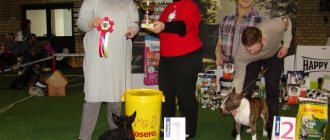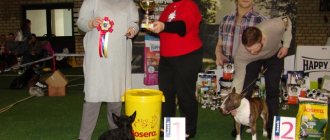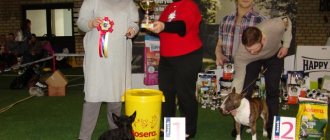Appearance
The African Silent Dog is a dog with a muscular body with light bones and high legs. Her body is proportional, with a wide, straight back and deep chest. The head is set high, which gives the animal a proud appearance. The tail is tightly curled into a ring that fits tightly to the croup. The ears are erect, slightly tilted forward. There are characteristic wrinkles on the forehead, which are especially noticeable in puppies. Almond-shaped eyes of a dark color make the dog's gaze expressive and intelligent.
The short coat is smooth, silky to the touch and very dense. It has a number of advantages - it does not shed, does not cause allergies, in addition, even with high humidity it does not have an unpleasant odor. The color can be black and white, red and white, brindle or tricolor, when black and white are combined with red tan. All marks have clear boundaries and are well formed. Whatever the color of the African silent one, the description of the breed requires that the paws, tip of the tail and chest be white. The height at the withers is 40–43 cm, weight is from 9 to 11 kg.
Description of the breed
According to the ICF classification, the African silent one belongs to the 5th group “Spitz and primitive breeds”, the 6th section “Primitive breeds”. The purpose of the breed is hunting, but today representatives are increasingly used as companions.
The characteristic “primitive” means that the formation of the breed occurred naturally, without human selection.
Appearance
Basenjis are visually very aristocratic; they have a light build with thin bones and high limbs. The appearance of representatives of the breed has a number of features established by the official standard:
- The skull is flat, of medium width with a poorly defined stop (the place where the forehead meets the muzzle). The distance from the top of the head to this point should be slightly greater than from the stop to the tip of the nose.
- There are pronounced wrinkles on the forehead. Even puppies have this feature, and at a young age, wrinkles are more visible.
On the forehead of the Basenji there are skin folds characteristic of the breed.
- The jaws are strong, the upper teeth should completely overlap the lower ones.
- The shape of the eyes is almond-shaped, located slightly obliquely, and the eyes themselves must be dark in color.
- The ears are small, straight, and have a pointed tip. They are located high on the top of the head, with the tip slightly closer to the center of the head than the outer edge of the base of the ear.
- The neck is strong and the back is straight and short. The sternum is deep and has well-convex, oval ribs, which contrasts with the thickness of the waist.
- The tail is another feature of the breed; it must be high and tightly curled (with one or two curls).
- The limbs are thin-boned, long, and the paws are narrow with well-curved short toes.
The following sizes are considered ideal for representatives of the breed:
- for males: height 43 cm, weight 11 kg;
- for females: height 40 cm, weight 9 kg.
In movement, the African Shepherd is inimitable - it quickly rushes forward with long, swaying steps. The dog is characterized by grace and determination, typical of hunting breeds.
Non-barking dogs run very fast, but maintain harmony and beauty in movement.
The Basenji's coat is short, smooth and lies close to the body. Several color options are allowed:
- rich black and white;
- red (red) with white;
- tri-color (black and white with red-brown tan marks and distinct spots on the fashion);
- brindle (red with black stripes, the more clearly the pattern is visible, the better).
Basenjis come in a variety of colors, including red, black and brindle.
In colors, white should be located on the paws, chest and tip of the tail, but this is not a mandatory requirement. The main thing is that the white color does not dominate in quantity over the main ones.
Another important feature of non-barking dogs is the absence of a specific odor from their fur. This breed belongs to the group of those that are least likely to cause allergic reactions in humans.
Character and psyche of the breed
Basenjis are active dogs with a lot of energy; they accelerate quickly and sharply on the street, driven by the hunting instinct, and at home they show themselves as affectionate and devoted pets. Zande dogs are very clean in all respects, they are neat and quiet. One of the most striking features of the breed is its lack of barking. And although representatives do not bark in the usual way, they can make a specific sound, similar to a rumbling, when excited, and also howl in the Tyrolean manner. The breed is characterized by vigilance, which does not allow it to immediately trust strangers - the dog will need time to observe and get used to the newcomer in the environment. But with its owner, the dog will be very gentle and affectionate, constantly showing its love.
The ideal owner for a Basenji will be an active person who will be able to devote time to his pet. A family is also a good option, but it is better if the children are not very small - the pet will get along well with them in any case, but it is not very patient. The attitude towards the hunting category causes intolerance towards cats and small domestic animals, and Basenjis do not always get along well with their relatives. It is better if the pet is the only one and loved.
Without proper attention and training, a dog left to its own devices is prone to destructive behavior. Untrained pets often cause serious mischief, especially when left alone at home. The owner’s actions and prohibitions must be systematic; the animal should not be given any concessions - this will not benefit the upbringing. But it’s also not worth showing cruelty and aggression - reasonable establishment and maintenance of boundaries will be enough. But in order to cope with the hunting instinct and achieve obedience on the street, the owner must either be a professional and constantly train with the Basenji, or take the dog to special training.
You can often notice a behavior that is atypical for other breeds in Basenjis - they like to wash themselves with their paws, like cats.
Disqualities and disadvantages
According to the requirements of the ICF, any deviations from the requirements of the standard are already considered a defect, and its severity is directly proportional to the degree of influence on the appearance and health of a particular individual. The reasons why a dog may be excluded from participation in exhibition and breeding activities will be:
- expressed and unjustified aggression;
- shyness, excessive cowardice of the animal;
- predominance of white color in color;
- albinism.
Story
Tracing of the breed began about 5,000 years ago. These dogs are native to Africa. Their images in the form of bas-reliefs and figurines were found on the tombs of the pharaohs. Embalmed canine bodies, soaked in incense, were discovered during excavations near their masters. This suggests that the African Silent Dog is a breed that was very revered. And today on this continent the Basenji is considered a family amulet, an animal that brings happiness and joy. Explorers who arrived in the Congo at the end of the 19th century noticed dogs with amazing hunting abilities, driving game into nets. Several individuals were taken from Africa to England in 1885, but, unfortunately, did not survive. Nevertheless, it was in this country that the African Silent breed standard was subsequently approved, which is still in force today.
The next attempt to remove the dogs was more successful. It took place in 1937, when Basenjis appeared first in the USA and later in Europe. Gradually, residents of many countries became acquainted with this breed and fell in love with self-confident and fearless dogs. In 1988, the World Canine Organizations officially approved it.
Historical reference
The exact date when the Basenji appeared is unknown, since the breed is one of the most ancient, and its history goes back more than 6 thousand years. The first representatives were discovered in Egyptian tombs, where they were buried next to the pharaohs. Central Africa is considered to be its homeland, from where dogs were brought as gifts to the rulers of Egypt. Dogs first came to Europe in 1895; they were brought home by English sailors, but the pets did not survive there. Only in 1905 did individuals appear at the Berlin Zoo, where they were presented as exotic animals, and in 1930 they were reintroduced to England.
The Basenji is a breed from Central Africa with a long history.
The breed has many names, one of them - Congo Terrier - was given at the first exhibition in the USA in 1937. Representatives are known as African Shepherds or Silent Dogs, Non-Barking Dogs, Congolese Bush Dogs and Zande Dogs.
The Zande are a people located in the north of Central Africa, where the Basenji come from.
In 1964, Basenjis were recognized by the Fédération Cynologique Internationale (FIC) with standard No. 43 . Today, the edition of the standard dated November 25, 1999 is valid.
Character
Over the entire period of breeding, the dogs have earned an excellent reputation. Basenjis are distinguished by their flexible character, but at the same time they do not show servility. Infinitely devoted to their owner, they at the same time respect other family members. They are non-conflict, try not to get into a fight, even if it is provoked by someone. This speaks of the high degree of balance that the silent African can boast of. Owner reviews about this breed are mostly positive. The owners are usually very pleased with the dog’s behavior and note the complete absence of aggression in its character.
Many of them are attracted by the extraordinary cleanliness and neatness of the Basenji. After each meal, the dog diligently wipes its muzzle and takes care of its fur with the help of its tongue, constantly licking it, as cats usually do.
The African Silent Dog breed is a hunting dog, so its representatives have a very sensitive sense of smell and a developed instinct of pursuit. If you have to chase prey, you must certainly overtake it. Moreover, the dog can be so carried away by this that it can get lost.
Basenji dog kennels
Below are the kennels where you can choose and buy a Basenji dog or puppy. Kennel Royal Pets| MoscowThe association of nurseries “ROYAL PETS” offers high-breed puppies for sale. Our dogs are friendly, have good health, and are not prone to allergies and other diseases. Parents of babies eat natural food. All puppies are branded and have a full package of documents. We welcome positive, energetic, wealthy and accomplished people who value health, temperament and purebred when choosing a puppy. We do not sell our dogs to minors. It is possible to deliver a puppy to another city or country by train or plane. We provide full documentary support. You can get information about the care and maintenance of puppies, training, and characteristics by calling us.
All nurseries and breeders registered in our catalog now have the opportunity to make their nursery more visible and attract more visitors ! This is what information about your nursery might look like in the catalog:
To activate this service you need to send
an SMS to number 1315 with the text:
hhapitomnik NURSERY NUMBER
Where
KENNEL NUMBER is the number of your nursery directory. Finding out the number of your nursery is very simple, you need to go to the nursery page and you will immediately see it in the address bar of your browser, it will look something like this: The cost of such placement is up to 120 rubles for 30 days (Including VAT)
The exact cost of SMS for your operator you can find out more here – Customer Support Service
Family relationships
The African Silent Dog is an ideal dog for a home with small children. They easily find a common language with each other and participate in joint games. True, a representative of this breed is not one of those that allows you to do whatever you want to you, so you shouldn’t leave it alone with a child.
The Basenji will get along with other animals in the house only if they allow him to dominate. Then the relationship between them will be friendly and even develop over time into a strong attachment. At the same time, the size of the friend does not matter at all - the silent African will be friends with both a huge dog, which is much larger than himself, and with a hamster. You can keep several of these dogs at the same time.
Breed Features
The main thing that distinguishes the Basenji from all other dogs is the absence of bark. There are two versions to explain this feature. According to one of them, it is believed that when hunting in conditions of almost no vegetation, the game did not need to be lured out of the forest, but it was necessary to sneak up on it. Therefore, dogs gradually forgot how to bark as unnecessary. Another version explains the absence of barking by the fact that the African silent is a very old breed, formed from ancient dogs that did not yet know how to bark.
These animals are unusually mobile and very active, as befits real hunters. They are constantly trying to run somewhere. This is a vital necessity for them. At the same time, in the apartment the dog behaves quite calmly and quietly. But once she gets out of the house, her full potential in life is revealed.
The South African Silent Dog has a very negative attitude towards bathing. This may be due to genetic memory reminiscent of water-dwelling crocodiles. Therefore, you should not force your pet to swim.
The Basenji is sometimes called a cat-dog. And there are reasons for this. In addition to amazing cleanliness, their behavior in the house is very similar: just like a cat, the silent African moves smoothly and silently, makes purring sounds, washes itself with its paw and can even go to the litter box.
Basenji diseases
The average lifespan of a non-barking dog is 13–14 years . In general, these are very strong and healthy animals, but they have weak points - the urinary system and eyes. The most common ailments are:
- Urolithiasis is the formation of stones in the kidneys and bladder. It is quite difficult for the owner to understand at an early stage that the dog has a problem. It is important to go to the doctor as soon as your pet is diagnosed with urinary retention - its absence for more than 2 days. The disease is detected using ultrasound or analysis of urine itself in the early stages. Therapy involves diet, prescription of painkillers and antispasmodics, and in difficult cases, surgery to remove stones. Left untreated, it can lead to inability to urinate, bladder rupture, and death.
- Progressive retinal atrophy is a congenital developmental disorder or damage to retinal cells that gradually leads to blindness. Symptoms usually become noticeable between 1 and 5 years of age. The reason to contact a veterinarian should be that the dog has become difficult to navigate in the dark, and then in the light. The disease cannot be cured, but the owner needs to carry out special training in order to prepare the animal for vision loss.
Care and maintenance
The dog's small size, inability to bark and extreme neatness make it one of the most suitable breeds for apartment living. Caring for her is practically no different from caring for any other pet. Basic hygiene procedures include wiping the eyes, trimming the nails and cleaning the ears. Short hair does not need to be combed; you just need to rub it occasionally with a hard glove to get rid of dead hairs.
You can wash them only if absolutely necessary - probably no one is more afraid of water than the African silent bird. The description of the dog above explains the likely causes of this fear. To prevent your pet from freezing while walking in severe frost, you can buy him special clothes. Regular parasite treatment procedures and timely vaccination are mandatory.
It is worth considering that these dogs are very active, easy-going and need long daily walks. It is almost impossible to tire them out. At home, the Basenji will be a quiet and calm dog only if it is given a good walk. Otherwise, he can throw out his energy by causing mischief in the apartment.
Feeding
Despite its incredible mobility, the African silent bird has a tendency to become obese. Reviews of the breed of owners of these dogs note that their pets are demanding about food. Many people note that they have no sense of proportion. Basenjis can eat as much as is offered. You have to watch the portions in moderation. The diet must include lean meat. In addition to this, the menu includes some fish, offal, and porridge. Occasionally, no more than once a week, you can give bones. Puppies require dairy products and cottage cheese.
It is not recommended to use ready-made dry food in the Basenji's diet. Food from the owner's table is not suitable for these dogs. Salty, smoked, spicy, fatty and sweet foods are contraindicated for them.
Basenji care
The Basenji is perfect for keeping at home; it does not require a lot of space, but you won’t be able to shirk walks - they are necessary. Caring for a Zande dog will not be a problem even for a novice breeder. The breed has practically no specific nuances; the owner will only need:
- wipe off dirty fur and bathe the dog as it gets dirty (usually this is done no more than 2-3 times a year);
- Brush the short coat with a brush 1–2 times a week to remove lost hairs;
To care for Basenji fur you will need a special brush.
- during shedding, brush more often to simplify the process - daily;
- feed in moderation, without overfeeding, the dog should remain light and fit;
- walk at least 2 hours a day so that the hunting dog can run around enough.
The spirit of pursuit is in the blood of the Congo Terrier, so it is better to never let it go unattended, especially in an unfamiliar area - fearlessness and excitement can take your pet far.
Separately, it is worth focusing on nutrition. The breed has no special dietary restrictions; Basenjis will cope well with both ready-made food and natural food. In the first case, the owner should choose high-quality food (super-premium and holistic categories) for active dogs (for example, Brit Premium Sport for dogs with increased physical activity, Arden Grange Adult Dog Prestige for adult dogs with increased energy needs), and in the second - provide your pet with a high-quality diet, consisting half of meat (veal, beef, chicken, turkey) and necessarily including vegetables, unsweetened fruits, herbs, eggs, dairy products and herbs.
Basenjis require food designed for pets with increased physical activity.
Training
Basenjis are smart and quick-witted dogs; they remember and reproduce commands well. But it is important to understand that they can hardly be called a model of obedience and complaisance; they have an independent character and considerable ability for cunning. Therefore, the owner should not be surprised that the dog will always figure out how to do everything his own way. In training, a basic obedience course is required, as well as additional classes on walking behavior - the hunting instinct often interrupts the owner’s commands, so it’s worth working with this separately. You can’t do without a course of socialization - from puppyhood (from 3 months), the dog needs to be taken for walks, introduced to other people, relatives and territories.
Education and training
The African silent bird can become a true friend and companion for a person. The description of this dog notes its high mental abilities and intelligence. However, no matter how smart a dog is, it needs to be raised and trained. Basenjis are quite easy to train and understand commands very well. The owner's approval is very important for them, so affectionate words and praise are the main method of training. In addition to teaching the dog to respond to its name and approach its owner, it is very important that the pet forever learns that it is forbidden to pick up anything from the ground. The African Silent Dog is one of those breeds of dogs that love to “get wild”, that is, on occasion they will not miss the opportunity to grab some carrion or an old bone.
During training, rough handling of the dog and raising your voice is unacceptable. Each execution of a command should be followed by praise. These dogs have excellent memory. They are able to learn all commands the first time.
Health
Due to the fact that the breed was formed in natural wild conditions, its representatives have excellent health. However, there is a predisposition to certain diseases. Most often, these dogs have retinal atrophy, cataracts, entropy with protein loss, and urolithiasis.
It is recommended to visit a veterinarian approximately once every six months so that if a health problem is detected, treatment can be started on time.
Today, the African Silent Dog breed is still considered quite rare. A nursery that breeds it cannot be found in every city. The cost of these dogs cannot be called low. Therefore, having decided to purchase a Basenji puppy, it is best to contact a special breed nursery, where experienced breeders will assist in choosing a future friend and raising him.
Angel Congo > About the nursery About the nursery
We welcome you to the website of the Angel Congo nursery!
My name is Irina. My daughter Yulia (kennel handler) and I are breeding Basenji dogs. Our cattery is registered with FCI/RKF on September 28, 2005 (No. 6998). Official mark TNE. Our acquaintance with the Basenji breed began in 1998 with a legendary dog, who later became the father of many children, an advertising star, the ancestor of a whole generation of representatives of the breed in Russia and abroad - STRONG STAEL TASSILIN AHAGGAR. We fell in love with the wonderful Basenji breed and decided to create our own special breed kennel. The purpose of creating the nursery is not commercial, rather a hobby and boundless love for Basenji. Most of our producers were selected from leading nurseries in Russia, Europe, and America; we are very proud of our pets and are eternally grateful to the nurseries from which they were purchased. Our dogs have repeatedly become winners and prize-winners at the most prestigious exhibitions in Europe and Russia. The main secret of the nursery is a conscientious attitude towards raising puppies so that they grow up to be excellent representatives of their breed. All our puppies are raised with love and care in a warm home environment and are part of our family. We help them to be born and monitor their future fate. Our pets are full members of our family, they are infinitely loved, they delight us with their presence, they are surrounded by care and attention, they eat high-quality natural products, which is the key to health, they are regularly examined by a veterinarian and are promptly vaccinated with modern, proven medications. Our nursery is small, we believe that we need to devote time to each pet, since in addition to its appearance, the Basenji's character is very important. These are very smart, sociable and affectionate animals. The goal of our nursery is to obtain high-quality offspring with excellent modern type, good health, excellent temperament, which best correspond to the breed standard, as well as to popularize your favorite breed and simply enjoy communicating with the Basenji. We want the animals from our nursery to be worthy representatives of their breed. Many puppies of our breeding actively participate in exhibitions. We are connected with their owners not only by common interests - a love of Basenjis and exhibitions, but by friendship. On the pages of our website you can find all the information about the breed, get acquainted with our favorite animals, and also find answers to questions that might interest you. And if you have an interest in our breed and a desire to purchase a puppy, then call us or write to us. We are always open for communication and ready to advise you on issues of care, education, maintenance and feeding of the puppy. No matter how minor the issue, we will never refuse advice and help. I hope that your stay on our site will be pleasant for you!











